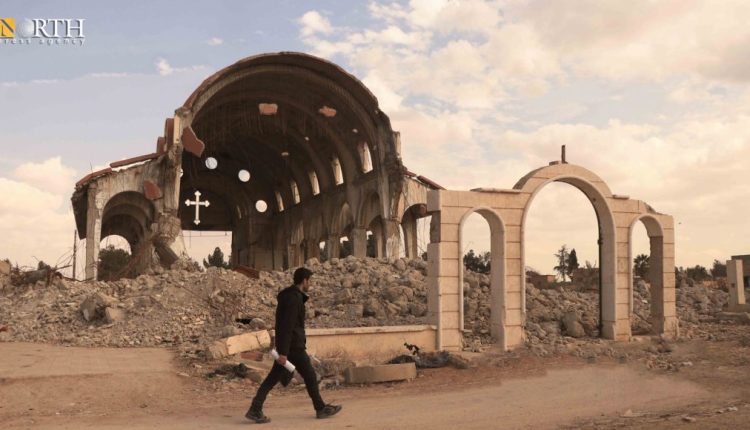
By Dilsoz Youssef
HASAKAH, Syria (North Press) – As the international community continue neglecting and marginalizing the issue of ISIS members and their families in the prisons and camps in Northeast Syria, voices calling for bringing them to justice before being repatriated to their countries are rising especially by the communities of Northeast Syria.
The Syriacs are one of these communities. Syriac people in Hasakah Governorate, northeast Syria, are strongly demanding the prosecution of the militants of the Islamic State (ISIS) as they suffered greatly from the atrocities they committed against them.
During the control of ISIS over the region, the Syriacs were forced to flee their homes, their churches were destroyed, and their properties were stolen.
Before the Syrian conflict, the Syriac population numbered approximately 2.2 million. However, this figure significantly decreased to around one million with the onset of the crisis, with approximately 60,000 of them are currently residing in the areas of Hasakah and Qamishli.
“ISIS must be tried in NE Syria”
Georges Ibrahim, a Syriac resident of Hasakah, says the ISIS militants and their families should be tried in the region before being sent back to their countries.
He believes that the international community should hold them accountable for their actions, as they pose a significant threat.
He highlighted the fact that the ISIS members and their families must be held accountable, and justice must be served for the victims. “We will not tolerate them evading justice; they are ticking bombs.”
In June 2023, the AANES announced it would hold trials for foreign ISIS militants in line with international and local terrorism laws.
The AANES explained this decision was made because the international community failed to answer its repeated calls to ensure justice for the victims.
However, the international community did not provide support or assistance for the trials.
Nawal al-Salloom, a Syriac woman living in the city of Hasakah, affirms that they were eyewitnesses to the atrocities committed by ISIS in Hasakah and its neighboring villages, particularly in the Khabur area. These crimes included forced displacement, killings, and abductions.
She emphasizes that ISIS is a “dangerous and criminal” group, and it is incomprehensible that countries have repatriated their ISIS-linked nationals without subjecting them to trial so far.
In early 2015, ISIS attacked Christian villages on the banks of al-Khabur River in Tel Tamr and took control of 33 Assyrian villages for over three months. The group killed and abducted around 280 Assyrians, including more than 50 children and 100 women. ISIS destroyed seven churches in those villages, including St. Mary Church in the village of Tel Nasri, which was a significant religious destination for Assyrians in Syria.
All communities are affected
Maha Shabo, another Syriac woman from Hasakah, says the Syriacs are not the only ones who have suffered from the ISIS’ crimes, as all Syrian communities endured suppression and persecution.
She explains that they experienced displacement and oppression since the Sayfo massacres. During the war, they had to deal with ISIS, which held similar extremist views. They were forced to leave their homes, women were taken captive, and churches were attacked.
Shabo indicates that the repatriated ISIS-linked individuals have not been put on trial yet.
She emphasizes that demanding a fair trial for ISIS-linked individuals is a response to the injustice they faced, not just a desire for revenge.
According to human rights reports, more than 10,000 ISIS militants surrendered to the Syrian Democratic Forces (SDF) after capturing the town of Baghuz in the eastern countryside of Deir ez-Zor, eastern Syria, in 2019, with the support of the U.S.-led Global Coalition to Defeat ISIS.
The prisons and camps in AANES areas house more than 60,000 ISIS militants and family members from 58 Arabic and foreign countries.
Some countries like France, Russia, and Sweden repatriated a few of their citizens through coordination with the AANES, but the lack of international support for trials in Northeast Syria has further complicated the situation.
The Syriac people actively participate in the institutions of the Autonomous Administration of North and East Syria (AANES) through the Syriac Union Party, alongside the Syriac Military Council and the Sutoro forces.
These groups played a crucial role in the fight against ISIS, working in conjunction with the Syrian Democratic Forces (SDF) and the Internal Security Forces of North and East Syria (Asayish), in addition to the administrative institutions of the AANES.
